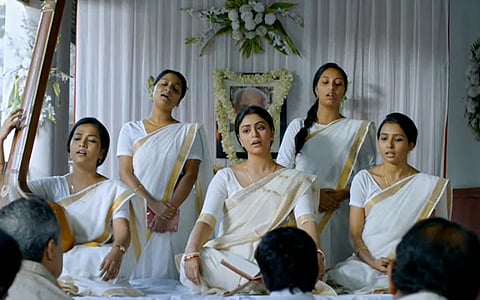
- Reviews
- Power List 2024
- Cannes 2024
- In-Depth Stories
- Web Stories
- News
- FC Lists
- Interviews
- Features
- FC SpecialsFC Specials

Director: Aritra Mukherjee
Cast: Ritabhari Chakraborty, Soham Majumdar, Soma Chakraborty, Subhashish Mukherjee, Manasi Sinha
Shabari (Ritabhari Chakraborty), the protagonist of Brahma Janen Gopon Kommoti, is a woman priest. While conducting marriages, she categorically denies to perform the 'kanyadaan', which, if you think about it, is just another name for the commodification of women. She is a professor of Sanskrit in a college (apart from being a performing artist). So if you are going to debate with her about how the ancient scriptures forbid women to become priests, which is supposed to be the domain of the Brahmin male, you better watch out; girl has done her research. She even has her own all-women team of assistants.
This part is taken from real-life woman priest Nandini Bhowmick, and it's easy to see why the idea fit right into the brand of films Shiboprosad Mukherjee and Nandita Roy (makers of such films as Bela Sheshe, Posto and Mukherjee Dar Bou) like to produce: stories set in a Bengali domestic space with a message. The rest is what the film tries to do with it. Shabari gets married to Nice Guy Vikramaditya (Soham Majumdar)—in a nice touch, when the priest in her own wedding ceremony forgets a line, she completes it. But this is not so much a story of Shabari and her husband as it is about Shabari and her mother-in-law Amarabati (Soma Chakraborty), a politician who wields considerable power in the fictional town of Batashipur, and a dominating matriarch who is more patriarchal than the men of the house.
When we first see Amarabati—prone to mispronouncing English words, which, somehow, the makers think is still funny in 2020—she is dissing some woman she'd heard about who breastfed her newborn in a movie theatre. (She has for company her sister-in-law Gurudasi (Manasi Sinha), an astrologer, who is equally regressive). We have already been introduced to Shabari; so we know this is all going for a head-on collision: a marriage of the saans-bahu rivalry trope—an abused TV serial staple—and the women-empowerment movie. Very nice. Except, Brahma Janen fails to turn all this into compelling drama. This is a loud, preachy film with a bad sense of humour.
Even the bits that seem inventive at first lose their steam because of the lack of depth in the writing and a lack of flair in direction. One such scene is where Shabari is challenged by Purut Moshai (a hammy Subhashish Bhattacharya), the head priest of Batashipur, for a duel of chants—much like Kobigaan, a Bengali folk tradition of wandering minstrels engaging in musical battles. Whereas the drama of such contests come from words, and the turn of phrases spun by the players, Brahma Janen misses a trick by letting the two spit unintelligible Sanskrit shlokas at each other, which is impossible to follow.
The choice of setting the story in the outskirts of Kolkata, and not the city, is the correct one. But the large family mansion, one of those renovated rajbaris, where the action is largely confined, looks like an expensive-looking heritage property, not someone's house.
The contest between Shabari and Amarabati is no fun either; their clash doesn't yield the dramatic tension it should've. For example, there is some sense of danger in the scene where Amarabati offers to drop her daughter-in-law to the college on the way to her office (she makes up an excuse to wriggle out of it). But when Shabari's husband and her in-laws finds out about her little secret, Amarabati's behaviour is surprisingly toned down; it's inconsistent with her character, who we've seen to be hostile and aggressive earlier.
Writer Zinia Sen and director Aritra Mukherjee attempts to pivot the story around the element of kanyadaan, and the ties it has with Shabari's past; but the scene where we are explained its significance in her life is unbelievably contrived. The choice of setting the story in the outskirts of Kolkata, and not the city, is the correct one. But the large family mansion, one of those renovated rajbaris, where the action is largely confined, looks like an expensive-looking heritage property, not someone's house. And what are we to make of the choice of name for Gurudasi's daughter, the only other young woman of the house beside Shabari? She is called Mala. (Shabari + Mala, get it? The film mentions the Sabarimala temple in Kerala, which opened its doors to women devotees last year for the first time since 1991). Are we supposed to laugh, or marvel at the subtle hints the film is throwing at us? Brahma only knows.